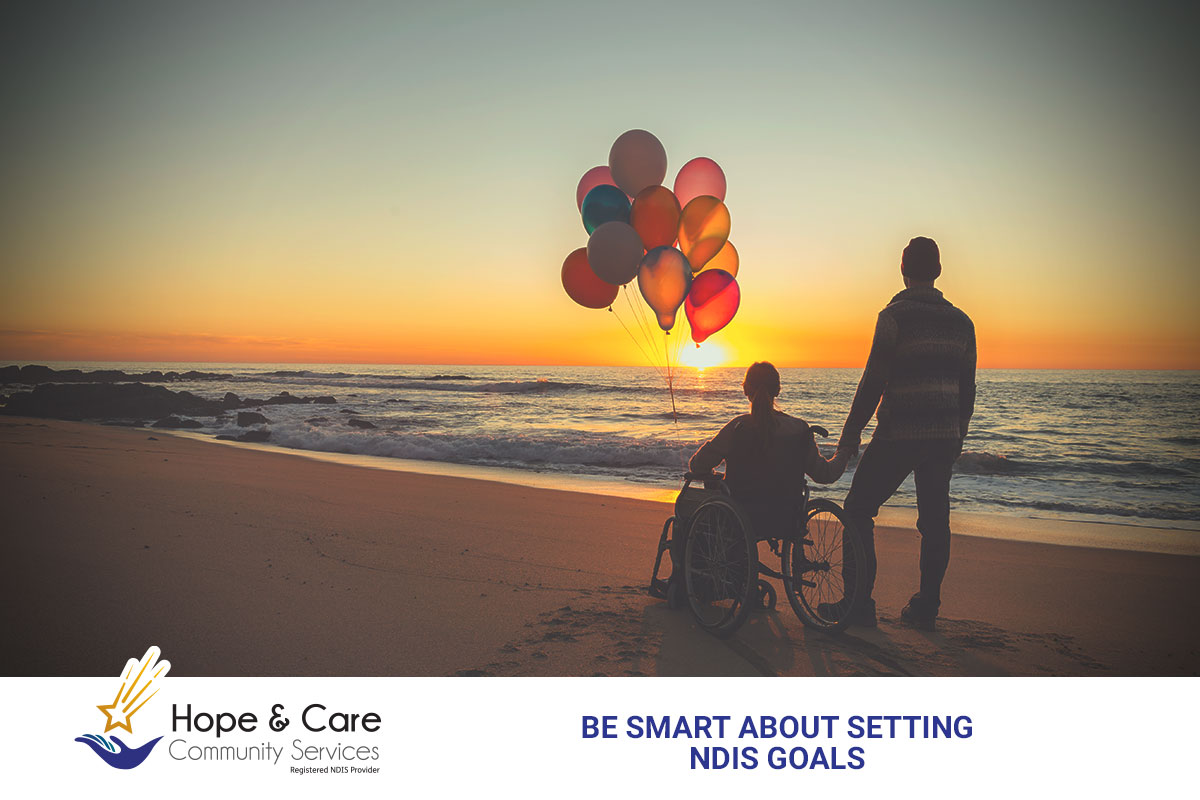
Setting goals is a vital part of your NDIS journey. By understanding and establishing the right goals, you can maximise the impact of your NDIS funding and live a life that reflects your personal aspirations and values. At Hope & Care Community Services, we believe that setting authentic, achievable goals is key to getting the most out of your NDIS plan. In this blog, we’ll guide you through the process of setting effective NDIS goals using the SMART framework, helping you to plan for a future that truly aligns with your needs and desires.
Why Are NDIS Goals Important?
The NDIS is designed to support people living with disabilities in achieving their personal goals. These goals are the foundation upon which your NDIS plan is built. By clearly defining your goals, you help the NDIS understand why you require specific funds and how these funds can help remove barriers to living a better life.
Your goals will also be discussed with your Local Area Coordinator (LAC) during planning meetings, giving them insight into your current situation and what you hope to achieve. While the size or type of goals you set doesn’t directly influence the amount of funding you receive, it’s important to ensure that your goals are genuine and reflect what’s most important to you.
Where to Start When Setting NDIS Goals
Setting goals can feel overwhelming, especially when thinking about your current situation, your future aspirations, and the areas where you need support. But don’t worry—there’s no need to put too much pressure on yourself. Start with a general brainstorm. Consider your current circumstances and where you’d like to be in the future. What aspects of your life bring you joy? What areas do you feel confident in, and where do you need support to improve?
It can be helpful to write down your thoughts or discuss them with a trusted friend or family member. Think about what you’d like to achieve in the short, medium, and long term. Once you have a list of ideas, begin to categorise them. Here are a few categories to consider:
Physical Goals
These goals relate to your health and well-being. They could involve activities like playing a sport, walking your dog without assistance, or accessing equipment that gives you more mobility and freedom.
Example goal: “I would like to be able to swim at the pool unassisted within the next 12 months.”
Social Goals
Social goals focus on your communication skills, social interactions, and community involvement. You might want to make new friends, join a group or club, or feel more confident in social situations.
Example goal: “I would like to have the confidence to join the local book club.”
Independence Goals
Independence goals are about how you manage your daily life. These could involve improving your mobility, gaining new skills, or achieving educational or employment goals.
Example goal: “I would like to find a job in the next 6 months.”
Using the SMART Framework to Set Effective Goals
Once you’ve identified your goals, it’s helpful to use the SMART framework to refine them. SMART is a widely-used goal-setting tool that ensures your goals are clear and attainable. Here’s how to apply it:
- Specific: Make your goal clear and focused. For example, instead of saying, “I want to be more independent,” you could say, “I want to be able to cook meals on my own.”
- Measurable: Your goal should be measurable so you can track your progress. This could involve setting milestones, like cooking one meal a week by a certain date.
- Achievable: Ensure your goal is realistic given your current situation and the supports available to you. Setting goals that are within reach helps to maintain motivation.
- Realistic: Be honest about what you can achieve. Your goal should be challenging but not impossible. If cooking every meal seems too daunting, start with one meal a week.
- Timely: Set a timeframe for achieving your goal. Having a deadline helps to keep you focused and gives you a clear end point to work towards. For example, “I want to cook one meal a week by the end of six months.”
Flexibility in Goal Setting
While it’s important to set specific goals, it’s also crucial to allow for some flexibility. Life circumstances can change, and your goals might evolve over time. By keeping your goals somewhat flexible, you allow yourself room to adapt as needed. For instance, if you initially want to pursue a career in retail but later decide to work with animals, your goal of finding employment remains, but the path to achieving it may change.
How Hope & Care Community Services Can Help
At Hope & Care Community Services, we’re here to support you in reaching your NDIS goals. Once you’ve set your goals, our NDIS plan management services can help manage the financial aspects of your plan, ensuring you have the supports and funding needed to succeed. We also provide regular reports so you can track how your funds are being used, giving you peace of mind and helping you stay on course.
Conclusion
Setting goals is an essential part of your NDIS journey. By taking the time to understand what you want to achieve and using the SMART framework, you can set goals that are both meaningful and attainable. Remember, the team at Hope & Care Community Services is here to support you every step of the way, ensuring that your NDIS plan is aligned with your personal goals and helps you live the life you want.
Finally, as Registered Provider, we understand the intricacies of the navigating services on your own. Unlock the full potential of your funding and provide the guidance you need to reach your goals. Feel free to Contact Us to explore how we can assist you on your journey. For instance, the NDIS is there to make a positive difference in your life, and we’re here to help!.
Want to learn more? Read other articles :
- Foundational Supports: Building Blocks of NDIS Success
- Support Coordination with Hope & Care Community Services
- Top NDIS Goal Setting Tips
HCCS is a registered NDIS provider. Learn more about our services.
♥ We are available in Brisbane! – Our team is just a call away!
